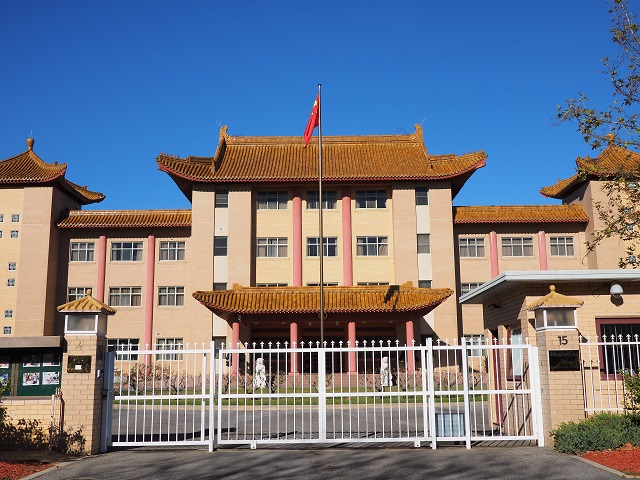The Strategist Six: Chen Yonglin
Posted By The Editors on June 5, 2017 @ 14:45

Welcome to The Strategist Six, a feature which provides a glimpse into the thinking of prominent academics, government officials, military officers, reporters and interesting individuals from around the world.
1. What do you believe are China’s intentions in Australia and the near region and do you believe China poses a threat to Australia?
China’s short term goal is to drive a wedge between Australia and the United States so that Australia doesn’t stand with the US if there’s a war across the Taiwan Strait. Its long term goal is to ensure Australia continues to supply high-grade minerals for its economic growth. China has run out of resources and it’s now a hungry dragon. The potential for mining the seabed is huge and that’s why China’s in conflict with neighbours such as Japan over the Senkaku Islands and with the Philippines over the Spratly Islands. Australia is the nearest major Western democracy and is considered the weak link in the Western camp. China is increasingly belligerent and Australia is fat meat with weak strength.
2. How will China go about this?
China’s strategic plan includes systematically infiltrating Australia which was its experimental first target for expanding soft power abroad. Beijing uses pro-communist Chinese community organisations as a base from which to radiate into society. It has set up groups to strengthen control over the Chinese community, to infiltrate Australian society and to oppose measures like sanctions by Western countries after the Tiananmen Square massacre. Such organisations can monitor and orchestrate the activities of Chinese students through the embassy in Canberra or the consulate-general.
3. China is Australia’s main trading partner and it would seem that China could obtain almost any raw materials it wants without coercion. Why does it think that’s necessary?
China’s leaders take a long-term view and most Australian politicians are always worried that China will stop buying Australian resources. Beijing has achieved its basic strategic goal of persuading Australia that it relies on China, not vice versa.
4. What did you personally experience as an embassy official that concerned you about China’s intentions in Australia and the region?
In 1999, while in the Ministry of Foreign Affairs, I drafted China’s Ten-year Diplomatic Strategy on the Oceania and South Pacific Region. China saw the ‘historical opportunity’ of 20-year economic growth while the US and other Western economies declined.
China started to focus on Australia strategically in 2001 when three RAN ships sailed through the Taiwan Strait. That shocked Chinese leaders. Intelligence indicated that Australia was moving its focus away from China and Asia and that it planned to join a North American Free Trade Zone. Chinese leaders decided in 2002 to let Australia become the sole supplier of LNG for Guangdong Province instead of contracting BHP in Indonesia even though it offered a much cheaper price. That proved very effective and reinforced China’s view that it could use its economic influence to weaken Australia’s alliance with the US. Then, China began to heat up relations with Australian through reciprocal official visits intended to build personal relationships and influence with Australian leaders
In February 2005, Vice Foreign Minister Zhou Wenzhong convened a meeting of high ranking diplomats in the metal screened room of the Chinese Embassy. Plans were made for visits to Australia by the Chairman of the National People’s Congress—Mr Wu Bangguo in May 2005 and Premier Wen Jiabao in 2006—and for President Hu Jintao to attend the Sydney APEC summit. Their Australian counterparts were invited to visit in exchange.
5. Do you still stand by the claim you made in 2005 that China had over 1,000 agents and informers here? What is that attitude of those given sanctuary in Australia after Tiananmen Square in 1989?
For China, every citizen is an intelligence collection asset. There’s a huge Chinese secret service network of 300–500 professional agents in Australia reporting to the PLA’s General Staff Headquarters, the Ministry of State Security, the Ministry of Public Security and the embassy. Then there are 500–700 external ‘informers’ in Chinese community and student organisations and language, academic and charity organisations.
The PLA’s General Staff Headquarters generally doesn’t intervene in political matters but in ‘counterterrorist activities’, there’s some crossover. (All Uyghur groups are labelled as terrorist). Agents often have close contacts with wealthy figures who’ve migrated here.
The General Staff focuses on collecting military and strategically important data. The State Security Ministry focuses on counter-espionage and collecting data including personal information about politicians and details of key technology. Public Security encourages Chinese in Australia to cooperate through threats of kidnapping or ‘voluntarily returning to China’ under its ‘Global Fox Hunting Operation’.
Australia’s push to ratify its extradition treaty with China is increasing fears in the immigrant community. The embassy has a Tibetan language speaker responsible for surveillance on the Tibetan community. After Tiananmen Square, more than 40,000 Chinese students in Australia obtained residence rights. Adding their immediate relatives, more than 100,000 Chinese became Australians. Many have intimate and diverse links with the PRC. They’ve often been ideologically trained and have a strong sense of Chinese chauvinism. Through their fear of Chinese political power and gangsters, some can be easily coerced.
6. How wise was Australia’s decision to sell a major Chinese company a 99 year lease on part of the Port of Darwin and how could China use this to disadvantage Australia or its allies?
That’s a whole human lifetime and Darwin is vital for countering attacks from the north. Australia’s natural defence barricade has been breached while China increases its heavy military presence in the South China Sea. It was a stupid decision by Australia. If Australia has no sense of protecting herself, why should the US care so much about this little brother? It proves China’s strategy towards Australia is working.
Article printed from The Strategist: https://www.aspistrategist.org.au
URL to article: https://www.aspistrategist.org.au/strategist-six-chen-yonglin/
Click here to print.